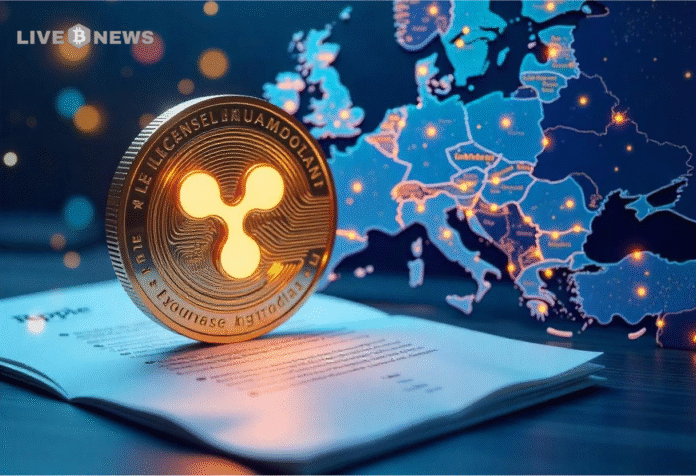Ripple’s RLUSD approved by Abu Dhabi’s FSRA as a Fiat-Referenced Token, enabling use by licensed institutions under ADGM rules
Ripple’s RLUSD stablecoin has received approval from the Financial Services Regulatory Authority (FSRA) of Abu Dhabi’s Global Market (ADGM). The approval classifies RLUSD as a Fiat-Referenced Token and allows its use by licensed firms for regulated financial services.
This marks another step in Ripple’s push to expand its regulated digital asset offerings in the Middle East.
RLUSD Approved by Abu Dhabi’s FSRA for Regulated Use
Ripple confirmed that RLUSD has been approved by the FSRA and is now officially listed as a Fiat-Referenced Token within ADGM.
The approval permits licensed financial institutions operating under FSRA’s rules to use RLUSD for activities that are within the regulator’s approved framework. These activities include trading, settlement, and other financial services.
#Ripple’s U.S. dollar-backed stablecoin, Ripple USD ( $RLUSD ), has officially been approved by Abu Dhabi’s Financial Services Regulatory Authority (FSRA) as an Accepted Fiat-Referenced Token.
The approval allows its use within the Abu Dhabi Global Market (ADGM), the UAE… pic.twitter.com/9oTpPK8cfT
— TheCryptoBasic (@thecryptobasic) November 27, 2025
Jack McDonald, Ripple’s Senior Vice President for Stablecoins, said the approval supports Ripple’s focus on trust and compliance. “The FSRA’s recognition of RLUSD as a Fiat-Referenced Token strengthens our commitment to regulatory compliance and trust,” he stated in a press release.
He also added that RLUSD has already reached a market capitalization above $1 billion.FSRA officials also welcomed Ripple’s progress and the expansion of their work in Abu Dhabi’s regulated environment.
Arvind Ramamurthy, Chief Market Development Officer at ADGM, stated: “We congratulate Ripple on achieving this important milestone; we look forward to seeing them make use of our robust regulatory framework.”
Ripple Expands Across Middle East and UAE
The approval in Abu Dhabi follows a series of developments by Ripple in the region since early 2024. Ripple had earlier secured a license from Dubai’s Financial Services Authority (DFSA), allowing it to offer digital asset services across the United Arab Emirates. This positioned the company to operate in multiple jurisdictions within the Gulf.
Ripple has also formed partnerships with local firms to promote blockchain adoption. These include a collaboration with Ctrl Alt to digitize Dubai’s real estate processes. The Dubai Land Department is now able to issue digital property title deeds on the XRP Ledger as a result of this partnership.
The continued licensing and regional expansion show Ripple’s aim to operate within approved financial frameworks. The firm continues to strengthen relationships with regulators and financial partners across the Gulf Cooperation Council (GCC) states.
Related Reading: Ripple’s RLUSD Approved as Recognized Crypto Token in Dubai
RLUSD Eyes New Markets Beyond the Gulf
Ripple’s RLUSD stablecoin is also being tested in other regions outside the Middle East. Last month, Ripple partnered with Fintech Bay in Bahrain to develop new blockchain-based payment services. The firm also plans to trial RLUSD for cross-border transfers within the Gulf region.
Ripple just scored a major win in the Middle East.
RLUSD has been officially recognized as an accepted Fiat-Referenced Token within Abu Dhabi’s ADGM—one of the most respected regulatory hubs on the planet.
This is huge for Ripple’s expansion in the region! #XRP pic.twitter.com/fvQqWN1r6T
— Skipper | XRPL (@skipper_xrp) November 27, 2025
Ripple is now preparing to launch RLUSD in parts of Africa. The company has formed agreements with three fintech companies—Chipper Cash, VALR, and Yellow Card—to promote stablecoin usage. These companies will help bring RLUSD-based services to millions of users across the continent.
Ripple continues to grow its RLUSD ecosystem through both regulatory approvals and partnerships. The approval from Abu Dhabi adds a strong regulated market to its expanding global footprint.





